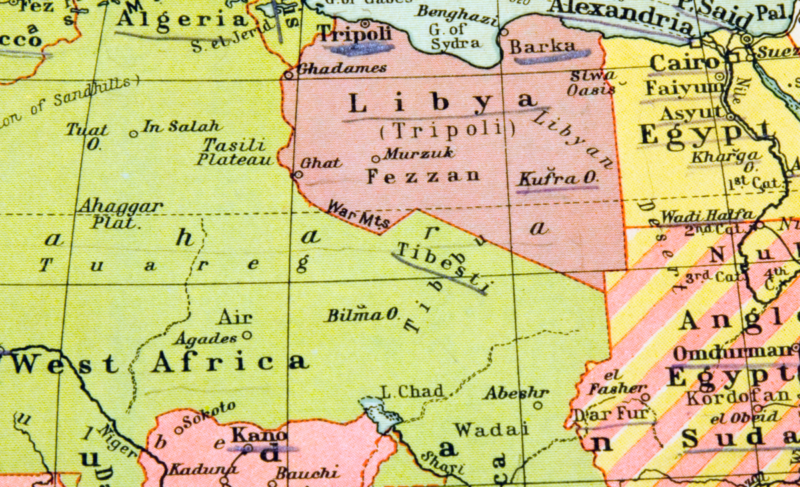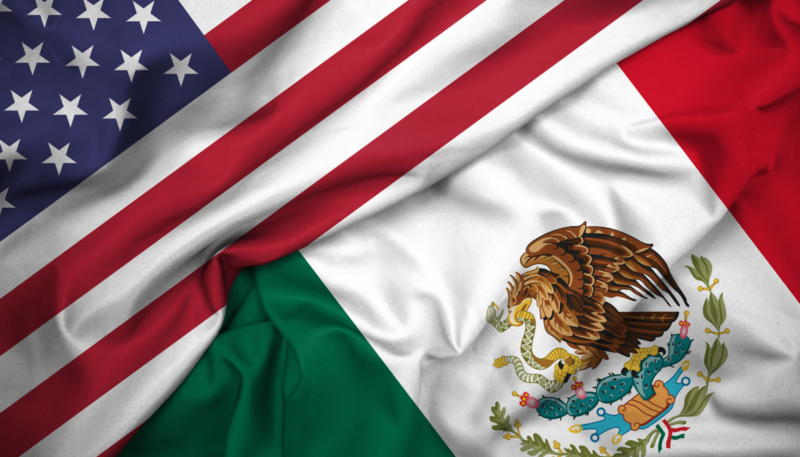Found 1,377 search results for keyword: label
Secession’s Opponents Embrace Colonialism and “Enlightened” Central Governments
The idea of secession for some regions of the United States—sometimes simplistically called "national divorce"—has increasingly been mentioned as a way to deal with the apparent growing divide between what are crudely called "red states" and "blue states." Polls suggest that perhaps a third of the American population "indicated a 'willingness to secede'"
Vehement opposition to the idea remains plentiful,...
Read More »
Read More »
Interview: Dr. Jens Ehrhardt sieht einen “Stock-Picking Market”
#Magnifivicent7 #China #Japan
Marketing-Anzeige: Im Interview mit Smartes Geld spricht DJE-Gründer und Vorstandsvorsitzender Dr. Jens Ehrhardt, warum er aktuell einen “Stock-Picking Market” sieht und warum er amerikanische Staatsanleihen weiterhin attraktiv findet.
Außerdem: warum Japan sein Favoriten-Aktienmarkt ist.
► Webseite: https://www.dje.de
► Podcast: https://spoti.fi/3AaB1mr
► Impressum: https://www.dje.de/impressum/
Seit über vier...
Read More »
Read More »
Legacies of Injustice and Racial Inequality
This article is a revised version of a talk given at the Oxford University Mises Society on January 16, 2024. The talk drew upon themes discussed in David Gordon and Wanjiru Njoya, Redressing Historical Injustice: Self-Ownership, Property Rights and Economic Equality (Palgrave Macmillan, 2023).
Supporters of free market capitalism are often thought, wrongly, to be unconcerned about human well-being. On the contrary, it is precisely because we are...
Read More »
Read More »
The United States Is a Colonial Empire, and an Extremely Successful One
For those who remember their high school textbooks, the issue of America's imperial history is very clear cut. American imperialism, the textbooks told us, was that fairly brief period in American history that lasted from 1898 to 1945. This was the period during which the United States acquired a number of overseas territories, including the Philippines and Puerto Rico, among others. The era of imperialism, we are told, ended in 1945 when the...
Read More »
Read More »
Climate Deniers Deny Socialism. That’s Why the Regime Hates Them.
Free markets is an unambiguous term, which implies a lack of inappropriate government intervention as consumers and firms pursue their own interest in a competitive environment. (my emphasis)
—Clifford Winston, “This Economist Really Loves Free Markets”
Inappropriate government intervention is a line government finds easy to cross, much like the Constitution’s “general welfare” clause. The latter was never intended to be a provision of infinite...
Read More »
Read More »
“Humanitarianism” as an Excuse for Colonialism and Imperialism
Spreading civilization and human rights has long been used as an excuse for state-building through colonialism and imperialism. This idea dates back at least to early Spanish and colonial efforts in the New World, and the rationale was initially employed as just one of many. The importance of the conquest-spreads-civilization claim increased, however, as liberalism gained ground in Europe in the nineteenth century. Liberals were more skeptical of...
Read More »
Read More »
Marktausblick mit Stefan Breitner und Markus Koch
Marketing-Anzeige
Die Konjunktur, Zinssenkungen und die Aktienmärkte
Die Börse in 2024 wird voraussichtlich stark von Wahlen in verschiedenen Ländern, aber besonders von der US-Wahl beeinflusst werden. Das zweite große Thema ist, wann die erwarteten Zinssenkungen in den USA und Europa kommen werden und wie viele Schritte wir sehen werden. Aktuell werden fast 6 Zinsschritte eingepreist.
Im Marktausblick-Dialog diskutieren Stefan Breitner,...
Read More »
Read More »
How to Free Ourselves from Government Money (Part III)
To save our economy from destruction and from the eventual holocaust of runaway inflation, we the people must take the money-supply function back from the government. Money is far too important to be left in the hands of bankers and of Establishment economists and financiers. To accomplish this goal, money must be returned to the market economy, with all monetary functions performed within the structure of the rights of private property and of the...
Read More »
Read More »
Zwei Perspektiven für 2024 – DJE-plusNews Januar 2024 mit Mario Künzel
#börse #zins #notenbank
Das Börsenjahr 2023 ist voller Euphorie zu Ende gegangen, aber nun stehen wir vor der großen Frage, ob diese auch 2024 anhalten wird.
Deshalb wagen wir im aktuellen DJE-plusNews-Video mit Mario Künzel einen Blick in die Glaskugel und skizzieren zwei verschiedene Szenarien: Die Weltkonjunktur schwächt sich ab, und verhindert eine Börsenaufschwung – oder der Abschwung bleibt aus und die Zinssenkungen kommen später als...
Read More »
Read More »
Switzerland marks start of China’s ‘high-level exchange’ with Europe
Chinese Premier Li Qiang is visiting Switzerland this week. The official state visit by China’s second highest ranking official signals a renewal in Sino-Swiss ties and the kick-off of his “high-level exchange” with Europe. Here’s what you need to know about official Swiss-Chinese relations.
Read More »
Read More »
What is a “Fed Pivot,” And When Is It Likely to Happen?
Chairman of the Federal Reserve, Jerome “Jay” Powell, recently sent mysterious shock waves into financial markets with comments that suggested that Fed rate cuts might come sooner than expected.
Stock and bond markets took this as a good sign. They were already in a Santa Claus rally and broke out to new highs for the year. The interest rate on ten-year government bonds, which had already fallen by almost 1 percent since October, threatened to...
Read More »
Read More »
The “Great Replacement” on the Frontier: When Anglo Immigrants Replaced Hispanics
The phrase "great replacement" has been increasingly thrown around by both conservatives and progressives in recent years. Conservatives claim the "great replacement theory" explains deliberate efforts by regime operatives to replace non-Hispanic whites with various groups of Hispanics and non-whites. Progressives, on the other hand, claim it is all a racist conspiracy theory.
I won't bore you with the details of the present...
Read More »
Read More »
Why More Secession Means Lower Taxes and More Trade
[This article is Chapter 9 of Breaking Away: The Case of Secession, Radical Decentralization, and Smaller Polities.]
When we hear of political movements in favor of decentralization and secession, the word “nationalist” is often used to describe them. We have seen the word used in both the Scottish and Catalonian secession movements, and in the case of Brexit. Often the term is intended to be pejorative.
When used pejoratively—as by the critics of...
Read More »
Read More »
When Nationalism Fuels Decentralization and Secession: Lessons from the Cold War
[This article is chapter 6 of Breaking Away: The Case for Secession, Radical Decentralization, and Smaller Polities. Now available at Amazon and in the Mises Store.]
During the early 1990s, as the world of the old Soviet Bloc was rapidly falling apart, the economist and historian Murray Rothbard saw it all for what it was: a trend of mass decentralization and secession unfolding before the world’s eyes. The old Warsaw Pact states of Poland,...
Read More »
Read More »
How the American Revolution Turned North American Foreign Trade on Its Head
[Chapter 1 of Rothbard's newly edited and released Conceived in Liberty, vol. 5: The New Republic: 1784–1791.]
After peace came in 1783, the new republic faced a two-fold economic adjustment: to peacetime from the artificial production and trade patterns during the war, and to a far different trading picture than had existed before the war. The largest change between the two eras of peace was the shift in trading patterns resulting from...
Read More »
Read More »
The Bad Deal That Was the New Deal: FDR’s Assault on Individual Rights
The New Deal’s War on the Bill of Rights: The Untold Story of FDR’s Concentration Camps, Censorship, and Mass Surveillanceby David T. BeitoIndependent Institute, 2023; x + 379 pp.
Few if any readers of this column admire Franklin Roosevelt, but as the historian David Beito reminds us in this outstanding book, most of his professional colleagues rank Roosevelt among our greatest presidents, second only to Abraham Lincoln. Those who accord him this...
Read More »
Read More »
Marktausblick mit Stefan Breintner und Markus Koch Dezember 2023
#börse #wirtschaft #künstlicheintelligenz #märkte
Marketing-Anzeige
Euphorie an den Börsen: Wird der Optimismus anhalten?
Die US-Notenbank hat seit ihrer letzten Sitzung für gute Stimmung an den Börsen gesorgt. Der Markt erwartet deutliche Zinssenkungen für 2024. Gleichzeitig ist ein sogenanntes “Soft-Landing” der US-Wirtschaft Marktkonsensus.
Im monatlichen Marktausblick-Dialog diskutieren Stefan Breintner, Research-Leiter von DJE und...
Read More »
Read More »
Why Secession Offers a Path to Wealth and Self-Determination
[This article is chapter 5 of Breaking Away: The Case for Secession, Radical Decentralization, and Smaller Polities. Now available at Amazon and in the Mises Store.]
One of the most consistent and enthusiastic defenders of human rights and “natural rights” in the twentieth century was the economist and historian Murray Rothbard. A self-described libertarian, Rothbard would also have fit in well among the more radical liberals of the nineteenth...
Read More »
Read More »
Modern Portfolio Theory Is Mistaken: Diversification Is Not Investment
According to modern portfolio theory (MPT), financial asset prices always fully reflect all available and relevant information, and any adjustment to new information is virtually instantaneous. Thus, asset prices respond only to the unexpected part of information since the expected portion is already embedded in prices.
For example, if the central bank raises interest rates by 0.5 percent, and if market participants anticipated this action, asset...
Read More »
Read More »
Sustainability of Eden: Can the UN’s Sustainability Agenda Succeed in a World Full of Conflict?
To achieve sustainability, the world needs stability. Yet two-thirds of countries are facing major economic, political, and social problems. Most of them are also experiencing ethnic or civil conflicts, mass migration and poverty crises. The question is whether the UN's sustainability agenda can succeed in the context of ongoing or simmering conflicts.
Paradoxically, preventing wars and conflicts isn't one of the UN's seventeen sustainable...
Read More »
Read More »





































